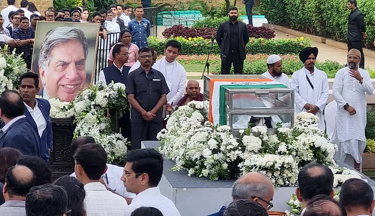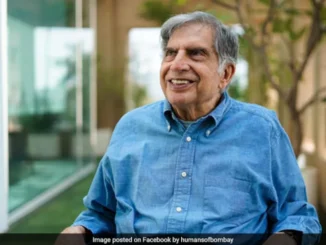
MUMBAI (TIP): The funeral of Ratan Tata, the former chairman of Tata Group, took place in Mumbai, marking the end of an era for one of India’s most influential business leaders. Thousands gathered at the National Centre for Performing Arts to pay their final respects. Union Ministers Amit Shah, and Piyush Goyal; Maharashtra Chief Minister Eknath Shinde and his deputies Devendra Fadnavis and Ajit Pawar; Opposition leaders Sharad Pawar, Supriya Sule, Uddhav Thackeray, and Raj Thackeray; industrialists Mukesh Ambani, Kumaramangalam Birla, and Harsh Goenka; Tata Group chairperson N. Chandrasekaran, and Reserve Bank of India Governor Shaktikanta Das were among those who paid tributes at the Worli crematorium and the National Centre for Performing Arts where his body was kept earlier in the day.
Maharashtra state declared a day of mourning, with a military salute accompanying the procession of his coffin to the cremation site. Ratan Tata, who passed away at the age of 86, is remembered for his philanthropic work in health, education, and animal welfare, as well as for transforming the Tata Group into a global powerhouse during his tenure as chairman from 1991 to 2012. Under Tata’s leadership, the conglomerate expanded its reach with high-profile acquisitions such as Jaguar Land Rover, Tetley Tea, and Corus Steel, positioning the company as a major player in industries from automotive to steel and telecommunications. While some ventures, like the Tata Nano car, faced challenges, Tata’s visionary leadership secured the company’s prominence on the world stage.
Born into a traditional Parsi family in 1937, Tata studied in the United States and joined the family business in 1962. He was mentored by JRD Tata, who saw in him the potential to lead the conglomerate. Tata’s contributions to Indian business were recognized with the prestigious Padma Vibhushan in 2008. Tributes poured in following his death, with Indian Prime Minister Narendra Modi describing him as “a visionary business leader, a compassionate soul, and an extraordinary human being.” Tata’s legacy will live on, not only through the vast business empire he shaped but also through his lasting impact on India’s social and economic fabric.




Be the first to comment